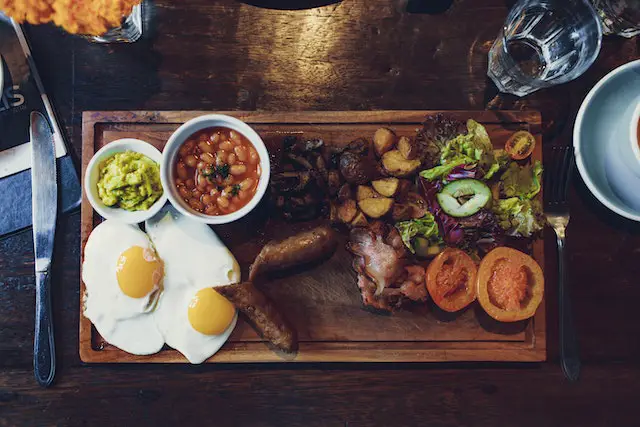
Eating enough protein is an essential part of a healthy diet, as it helps to build and maintain muscle and other body tissues.
Protein also plays a role in boosting metabolism, strengthening bones, and helping to keep the immune system functioning properly.
If you don’t consume enough protein through food sources your body will be unable to perform these important tasks, and you may experience some serious consequences.
In this article, we will discuss what happens if you don’t get enough protein in your diet.
Why is protein important?
Protein is one of the three macronutrients – along with carbohydrates and fats.
It is an important building block for our bodies and provides the necessary amino acids that we need to form bones, muscles, skin, hair, and other tissues.
Protein also helps to regulate hormones, enzymes, and genetic material.
Eating enough protein can help you build muscle mass and strength, maintain a healthy weight by increasing satiety (feeling of fullness), and boost your metabolism.
What happens if you don’t get enough protein?

When you do not consume enough protein on a regular basis, the consequences can be serious. Some of the most common side effects are:
Fatigue and weakness
If you don’t get enough protein in your diet, you may experience feelings of fatigue and weakness. This is because protein plays an important role in energy production.
Without it, your body doesn’t have the necessary building blocks to produce the energy that it needs to function properly.
As a result, you may find yourself feeling tired, weak, and sluggish more often.
Muscle loss
When you don’t get enough protein, your body doesn’t have the necessary building blocks to repair and rebuild muscle tissue.
As a result, you may experience muscle loss, which can lead to reduced strength, poor coordination, and a decrease in muscle mass.
Additionally, if you don’t get enough protein, your muscles may be more prone to injury and unable to recover as quickly from exercise.
Hormonal imbalances
Protein plays an important role in regulating hormones throughout the body.
If you don’t get enough protein, your body may become imbalanced, leading to mood swings, decreased energy levels, and other symptoms.
Additionally, hormones like insulin can become out of balance when you don’t eat enough protein. This can lead to increased sugar cravings and a greater risk for type 2 diabetes.
Weak Immunity
Protein plays an important role in keeping your immune system functioning properly.
If you don’t get enough protein, your body may be unable to fight off infection and disease as effectively.
Additionally, low protein intake can lead to a decrease in white blood cells, which are responsible for fighting off bacteria and viruses.
As a result, you may find yourself getting sick more often or taking longer to recover.
Slower metabolism
Protein plays a role in keeping your metabolism running smoothly.
If you don’t get enough protein, your body may not be able to burn calories as efficiently and can lead to an overall slower metabolism.
Additionally, low protein intake can lead to weight gain due to an increase in fat storage rather than muscle mass.
Increased risk of bone fractures
Protein is an important part of building and maintaining strong bones.
Without it, your body won’t be able to use calcium effectively, leading to an increased risk of bone fractures.
Additionally, you may experience weakened muscles and tendons, which can also increase the risk of falls and other accidents.
Poor concentration and focus
Getting enough protein is important for keeping your brain functioning optimally.
Without it, you may experience poor concentration and difficulty focusing on tasks.
Additionally, low protein intake can lead to decreased alertness, making it harder to learn new information or memorize facts.
Impaired wound healing capacity
Protein is essential for building and repairing cells, including those in the skin.
If you don’t get enough protein, your body may be unable to heal wounds as quickly or effectively.
Additionally, low protein levels can lead to dry skin and hair, making it more difficult for wounds to heal.
Low energy levels
Not getting enough protein can lead to low energy levels due to the inability of the body to create and store energy efficiently.
Additionally, protein plays an important role in keeping your hormones balanced, which can have a direct impact on your energy levels.
Without it, you may find yourself feeling tired and sluggish more often.
How to increase your Protein intake?

In order to get enough protein, you should be eating a balanced diet that includes plenty of lean proteins.
- Include lean proteins in your diets such as fish, poultry, eggs, nuts, beans and legumes
- Eat a variety of vegetables to ensure you get all the necessary vitamins and minerals
- Increase your intake of healthy fats like olive oil, avocado, and nuts to help keep you fuller for longer
- Limit processed foods and sugars as much as possible
- Add protein supplements to your diet if needed
- Drink plenty of water throughout the day
- Get regular exercise to help build muscle mass.
Conclusion
Getting enough protein is essential for optimal health, and if you’re not getting enough, it can lead to serious consequences.
Eating a balanced diet that includes plenty of lean proteins, healthy fats, and vegetables is the best way to ensure you’re getting all the nutrients your body needs.
Additionally, adding protein supplements to your diet and getting regular exercise can help you reach your protein goals.
With a little effort, you can ensure that your body gets the protein it needs to stay healthy and strong.



